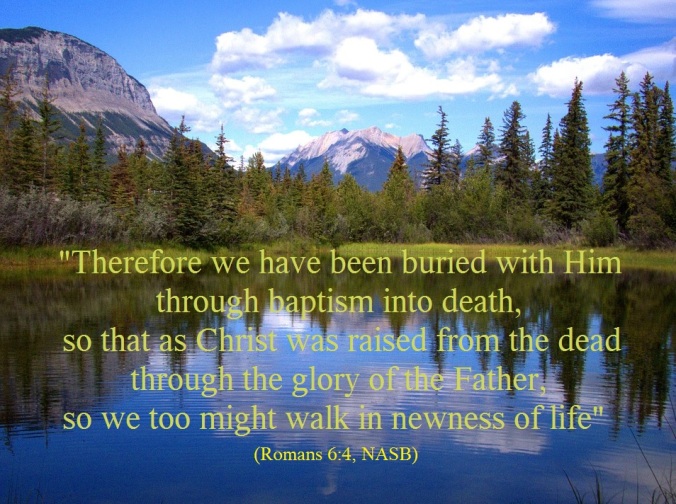“Go therefore and make disciples of all the nations…teaching them to observe all that I commanded you; and lo, I am with you always, even to the end of the age” (Matthew 28:19-20, NASB).
——————–
Contents:
1) Did God Know Us Prior to Our Physical Conception? (Tom Edwards)
——————–

-1-
Did God Know Us Prior to Our Physical Conception?
Tom Edwards
Have you ever wondered whether God actually knew of you before you were born or even conceived? Does He have that ability? Well, hear God’s words to Jeremiah and wonder no more! “Now the word of the LORD came to me saying, ‘Before I formed you in the womb I knew you, And before you were born I consecrated you; I have appointed you a prophet to the nations’” (Jer. 1:4,5). What an amazing foreknowledge of God!
David also knew that God was well aware of him — and of all his days to come — before he was even born, and says of the Lord, “For You formed my inward parts; You wove me in my mother’s womb. I will give thanks to You, for I am fearfully and wonderfully made; Wonderful are Your works, And my soul knows it very well. My frame was not hidden from You, When I was made in secret, And skillfully wrought in the depths of the earth; Your eyes have seen my unformed substance; And in Your book were all written The days that were ordained for me, When as yet there was not one of them. How precious also are Your thoughts to me, O God! How vast is the sum of them!” (Psa. 139:13-17).
Through the fulfillment of Bible prophecy, the Lord has demonstrated His ability to know of what is to come, such as with the thirty pieces of silver that Jesus would be betrayed for, and where that betrayal money would end up (Zech. 11:12,13; Matt. 26:14-16; Matt. 27:3-10); that Jesus’ death would not be by stoning, but would involve the piercing of the hands and feet (Psa. 22:16; Mk. 15:25; Luke 24:36-40); that the Lord’s clothing would be gambled for (v. 18), and that He would be “with a rich man in His death” (Isa. 53:9; Matt. 27:57-60) — to mention just a few of the prophecies concerning Christ that God knew far in advance.
And what about those who are named in prophecy even prior to their being born? Obviously, God knew of them before their conception. Consider, for instance, 1 Kings 13:1,2: “Now behold, there came a man of God from Judah to Bethel by the word of the LORD, while Jeroboam was standing by the altar to burn incense. He cried against the altar by the word of the LORD, and said, ‘O altar, altar, thus says the LORD, “Behold, a son shall be born to the house of David, Josiah by name; and on you he shall sacrifice the priests of the high places who burn incense on you, and human bones shall be burned on you.”’”
Josiah was born about 648 B.C. He became the 16th king of Judah, during the divided kingdom, and was one of its best kings. Some have placed the above prophecy, which was made during the reign of Jeroboam (the first king of the northern kingdom of Israel, during the divided kingdom), about 326 years prior to Josiah’s birth; and the fulfillment of it can be seen in 2 Kings 23:16-18: “Now when Josiah turned, he saw the graves that were there on the mountain, and he sent and took the bones from the graves and burned them on the altar and defiled it according to the word of the LORD which the man of God proclaimed, who proclaimed these things. Then he said, ‘What is this monument that I see?’ And the men of the city told him, ‘It is the grave of the man of God who came from Judah and proclaimed these things which you have done against the altar of Bethel.’ He said, ‘Let him alone; let no one disturb his bones.’ So they left his bones undisturbed with the bones of the prophet who came from Samaria” (2 Kings 23:16-18). “All the priests of the high places who were there he slaughtered on the altars and burned human bones on them; then he returned to Jerusalem” (v. 20).
So the Lord knew of Josiah’s name, of the lineage he would descend, and of these specific acts that he would perform – even prior to his having been born!
God also knew of John the Baptist prior to his being born to a childless couple who were “both advanced in years” and “had no child, because Elizabeth was barren” (Luke 1:5-7). For an angel of the Lord had informed Zecharias that “…your petition has been heard, and your wife Elizabeth will bear you a son, and you will give him the name John” (v. 13). And not only did God know that John would be born, but also that “many would rejoice at his birth”; and that “he will be great in the sight of the Lord” (vv. 14,15); that he would “turn many of the sons of Israel back to the Lord their God”; and that he would be obedient to the Lord in being “a forerunner” for Christ. John would be called “the prophet of the Most High” (v. 76). So God knew, in advance, all these things about John — including how his character would be, which is likened to that of the great prophet Elijah (v. 17).
And what about the other barren women whom God sent an angel to inform them that they would conceive a child — and, specifically, a son?
Consider Samson’s mother, for example: “Then the angel of the LORD appeared to the woman and said to her, ‘Behold now, you are barren and have borne no children, but you shall conceive and give birth to a son (Jdg. 13:3).
And to Abraham and Sarah, who “were old, advanced in age,” and “Sarah was past childbearing” (Gen. 18:11), the Lord had promised that “I will surely return to you at this time next year; and behold, Sarah your wife will have a son” (v. 10).
We are more than our physical body. For we also have an eternal soul or spirit, which has been created in the image of God. But where does that soul or spirit come from? Is it also in our DNA? Zechariah refers to God as being the One who “stretches out the heavens, lays the foundation of the earth, and forms the spirit of man within him” (Zech. 12:1). And Solomon tells us more of that spirit’s journey: “…For man goes to his eternal home while mourners go about in the street. Remember Him before the silver cord is broken and the golden bowl is crushed, the pitcher by the well is shattered and the wheel at the cistern is crushed; then the dust will return to the earth as it was, and the spirit will return to God who gave it” (Eccl. 12:5-7).
Mention is also made about Ishmael, the son of Sarah’s handmaid Hagar. God, in His omniscience, knew that Ishmael would “become the father of twelve princes” and “a great nation” (Gen. 17:20). And while Hagar was still pregnant with Ishmael, God also already knew what kind of person he would turn out to be. So the angel of the Lord told Hagar that Ishmael “will be a wild donkey of a man, His hand will be against everyone, And everyone’s hand will be against him; And he will live to the east of all his brothers” (Gen. 16:12).
We must understand that though God knows all about the universe, its time, and all things therein, yet He Himself dwells in eternity, a totally different kind of dimension. Or can it even be called a dimension? For eternity is without limits. To us, however, time in our realm is linear, like a timeline. We have our past, our present, and our future; and we exist only in the present or the now. But notice how Jesus expresses His eternal nature when some “…Jews said to Him, ‘You are not yet fifty years old, and have you seen Abraham?’ Jesus said to them, ‘Truly, truly, I say to you, before Abraham was born, I am” (John 8:57,58). Our minds cannot fully grasp what experiencing eternity must be like for God — anymore than trying to imagine all of infinity. For both go way beyond our mental ability.
God’s eternal nature is also seen in Psalm 90:2: “Before the mountains were born Or You gave birth to the earth and the world, Even from everlasting to everlasting, YOU ARE GOD.” Notice that this last part does not say, “You WERE God” or “you WILL BE God” — but, rather, “You ARE God!” God is not waiting to get to the “end” any more than He needed to get to the “beginning.” For He has eternally been. And though we cannot fathom it all, yet His eternal nature is indicated by His creation: “For since the creation of the world His invisible attributes, His ETERNAL POWER and divine nature, have been clearly seen, being understood through what has been made, so that they are without excuse” (Rom. 1:20).
No wonder God has no trouble at all in “Declaring the end from the beginning, And from ancient times things which have not been done, Saying, ‘My purpose will be established, And I will accomplish all My good pleasure’” (Isa. 46:9,10). For to the Lord, as Timothy M. Willis has stated, “the future is always present to the Omniscient One.”
After considering these above passages, surely we can see of God’s ability to have known each one of us, and what we would turn out to be, even prior to our birth. He does have a watchful eye on us — and desires for us to look to Him as well! That we might enjoy a relationship with God, which begins here in time and continues throughout eternity in heaven! And how much better one can know the Lord there!
(All Scripture from NASB and emphases mine.)
——————–
The Steps That Lead to Eternal Salvation
1) Hear the gospel, for that is how faith comes (Rom. 10:17; John 20:30,31).
2) Believe in the deity of Christ (John 8:24; John 3:18).
3) Repent of sins (Luke 13:5; Acts 17:30).
4) Confess faith in Christ (Rom. 10:9,10; Acts 8:36-38).
5) Be baptized in water for the remission of sins (Mark 16:16; Acts 2:38; 22:16; Rom. 6:3,4; Gal. 3:26,27; 1 Pet. 3:21).
6) Continue in the faith, living for the Lord; for, if not, salvation can be lost (Heb. 10:36-39; Rev. 2:10; 2 Pet. 2:20-22).
——————–
Tebeau Street
CHURCH OF CHRIST
1402 Tebeau Street, Waycross, GA 31501
Sunday services: 9:00 AM (Bible class); 10 AM & 5 PM (worship)
Wednesday: 7 PM (Bible class)
evangelist/editor: Tom Edwards (912) 281-9917
Tom@ThomasTEdwards.com
http://thomastedwards.com/go (Older version of Gospel Observer website without pictures, but back to March 1990)
http://tebeaustreetchurchofchrist.org/
http://ThomasTEdwards.com/audioser.html (audio sermons)










